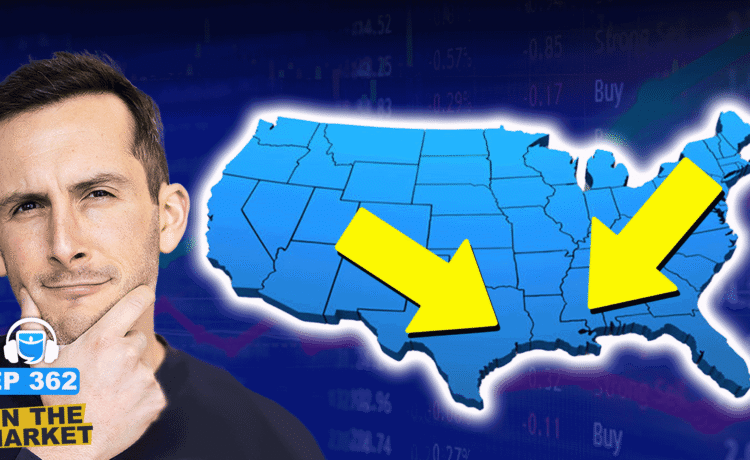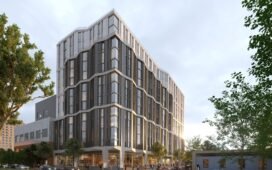Dave:
October 1st was a very interesting and somewhat pivotal day for the housing market. We had all sorts of policies and news converging on that day. Everything from a government shutdown to changes in FTI and Franny loans, changes to the student loan repayments, how FEMA is dealing with flood insurance. We have new tariffs that are going to be impacting the housing market. So a lot happened last Wednesday and this is important stuff that everyone needs to know. So today we’re breaking it down. Hey everyone, welcome to On the Market. I’m here, just me and Henry Washington today. What’s up bud?
Henry:
What’s up buddy? Glad to be here.
Dave:
I’m also glad to be here. It’s very unfortunate that Kathy and James just completely abandoned us.
Henry:
They just left us high and dry, but we’re going to pull it together. We’re going to pull it together.
Dave:
It’s pretty rude because the reason that they’re not here is because Henry and I are playing golf tomorrow during our normally scheduled time to record this and we’re like, yeah, if you guys can’t adapt to our schedule, we’re definitely still playing golf. So Henry and I will just do the podcast ourselves and that’s the real story of what’s going on. Henry and I are on a vision quest in Las Vegas right now for eight days before BP Con just having a lot of fun. So hopefully we’re going to see a lot of you there. This airs, I think, while BP Con will be going on. So hopefully we’ll be seeing you today Among the many thousands of people who will be here in Vegas talking about real estate,
Henry:
Come say hello and ask us who won our golf head-to-head tournament.
Dave:
What are the rules? Are we just playing straight up? You against me?
Henry:
I think we’re playing. I don’t know if you want to play match play or if you want to play just straight score, but we definitely need to implement our give me putt rule.
Dave:
Okay, so yeah, I saw this game I was proposing to Henry where if you know anything about golf, you get the distance of your putter. If your ball’s that close to the hole, it just counts. You don’t actually have to go make it. But in this game, for every alcoholic beverage you drink, you add the size of that can to the end of your putter. So if you drink four beers, you go from a three foot, give me to a five foot, give me, and that actually kind of matters and we might be playing this way.
Henry:
Yeah, absolutely. Absolutely. So stay tuned. We may capture some content.
Dave:
Alright, let’s get into our topic for today, which is all these things that are going on on October 1st. It’s basically just for whatever reason, I don’t think there’s any particular reason, just coincidence. There are all these things converging on the housing market and the economy as of October 1st. We of course now know that we are in a federal government shutdown and this could change by the time this airs. Just so you guys know, we are recording this on October 2nd and this comes out a few days later, so that may have changed, but the way it’s looking will probably still be in a federal government shutdown a week from now. We also saw that flood insurance program. There’s basically the national program that funds FEMA for flood insurance actually expired. And so any homeowners who had that will face some challenges. We saw new tariffs start on October 1st, and these seem really aimed at real estate, which I want to talk about 50% tariffs on kitchen cabinets and vanities, 30% on upholstered furniture and the sneaky one that’s probably going to impact housing a lot, 25% on construction trucks. Then we have all sorts of changing to FHA and HUD laws and more. We even have some other stuff not about October 1st to talk about today. So let’s just jump right into this. Henry, how are you feeling about this government shutdown? You got deja vu.
Henry:
Yeah, it feels like we did this not that long ago. I know it wasn’t super recent, but this has happened before and so we’ve kind of seen how it can or cannot impact the housing market.
Dave:
I had to Google it because it feels like we’ve had 30 government
Henry:
Shut. I think we’ve had two.
Dave:
Yeah, but there has been, I think it was 14 between 1980 and now, but it does feel like we’ve been talking about it way more. I think the last one was in 2018, 2019, something like that. But they’ve been threatening this every single year. So before we get into the details of what this actually means, big picture, high level, does this impact you specifically in your real estate investing
Henry:
Business? No, mostly because I’m not doing section eight housing, so I don’t depend on government funds to pay my rent. So the only real way that I see an impact on this is tenants who have government jobs who may not be getting paid for this time. So if they’re essential and they’re working, they’re working and not getting paid and if they aren’t essential and they’re not working, they’re not getting paid. So it could impact rent collection for the few tenants I have that are employed by the government. We’re always willing to work with people in situations like this. So I don’t see that it’s going to make a massive impact on me and my portfolio personally could also impact my flipping business if I had any buyers that were government employed who now can’t qualify for a loan or won’t be able to buy the house until there’s some resolution here. But other than that, no major impacts to my business.
Dave:
Yeah, that’s generally how I feel about it. I think the biggest thing across the whole housing market is really going to be sentiment is just do people pull back on spending or moving or just making big life decisions because this is just one more uncertainty in the economy and we’re already in a period where there’s a lot of uncertainty. So is this, just to add to that situation, but I do think that the section eight thing is real. Just so you know, the way this works is that Section eight payments should continue to go out at least for a period, but if there is an extended shutdown, there could be impacts to section eight funding. That is something that anyone who has section eight tenants or is thinking about getting into Section eight should be aware of. I was actually looking into this a little bit decimate is that as long as the shutdown is less than two months, then HUD and section eight shouldn’t be impacted, but we’re in this very unusual economic and political time.
So normally I’d say, oh, it’s going to get sorted for sure within two months, but I honestly have no idea. I have no idea if this is going to last two more days, two more months or what’s going to happen. Of course, the thing that really matters is of course the people who are directly impacted by this, if government workers are getting furloughed and although they will presumably get paid once this is over, people are going without paychecks and that could impact the economy. I’ve also seen some reports that travel and tourism could slow down. There’s always these negative impacts to the national parks to TSA and air traffic control because sometimes people if they’re not getting paid, they just don’t show up for work because suggesting you do that, but not saying I don’t understand that concept. So I think those things could impact just the general economy as well, but I think it’s right, if it’s short, it’s really going to be probably a blip in the grand scheme of things. If it’s long, it’s probably going to really impact the economy just by lower spending and lower total transactions in the housing market and in the broader
Henry:
Economy. And I think you’re onto something because if sentiment gets worse then people stop doing things like spending money, which is what our economy is based on. And so I think we’ll start to see an impact just in the fact that people are spending less money doing less things and that’ll create, everybody will feel that.
Dave:
Yeah, I’m not going to say it’s like the nail in the coffin, but it’s just one more thing in a world right now where there’s just so much confusion that’s just going to add a little bit more confusion. So that always has the potential for impact on the economy. I won’t get into this because it’s less about the housing market, but I do think this is just one more thing that is decreasing investor confidence. In the United States, we’re already seeing the dollar get a little bit weaker over the last couple of days. We’re seeing the stock market down a little bit, not a ton, but just a little bit. And if those things do continue, that could negatively impact mortgage rates as well. If those two things happen again, that could impact mortgage rates honestly in either direction depending on how long this goes. So it’s something we’ll keep an eye on and keep you posted on in the future.
Wait, before we move on, I have one more thing to say about government shutdowns. Why does Congress get paid during a government shutdown? That pisses me off. This is not a political thing. I just think both parties have shut down the government before and it’s their job to make sure it’s not shut down. Meanwhile, we’re not paying TSA agents or air traffic controllers or all these other parts of the government while we’re paying Congress. The people responsible for the shutdown get to keep paying. I want them to get their pay also suspended until the government reopens. How about that?
Henry:
I am wholeheartedly with you on that my friend.
Dave:
It’s basically going on vacation. You’re like, yeah, we vote to not work, but we also vote to keep getting paid. Super cool for us. Everyone else figure it out. It sucks. Alright, so that’s obviously the big news, but it might be one of the things that happened on the first that actually is the least impact on the housing market. So we’re going to take a quick break, but we’ll come back with some of the other things that will be impacting the market more directly. Stick with us. Welcome back to On the Market. I’m here with Henry Washington talking about what a big day. We had on October 1st just for the housing market. We just talked about the government shutdown. There are a few things that happened that I think more directly will impact the housing market. The one that’s really got me thinking is these new tariffs. If you haven’t heard, we were seeing tariffs implemented as of yesterday, 50% on kitchen cabinets, 30% on upholstered furniture and 25% on construction trucks. And this to me, these are just a package aimed at real estate investors. I know it’s not probably intended that way, but when I read these I was like, man, these are all going to hit real estate pretty hard. What was your reaction?
Henry:
Yeah, my reaction was, of course this happens the year I decide to build my first new construction homes that these tariffs come in and luckily I haven’t gotten my loans from the bank yet so I can adjust my budget to absorb a little more construction cost. But for a lot of new builders who have already gotten their funding for their projects and they based it on three tariff numbers like this could start eating into people’s profits. And my biggest concern or point of confusion is it seems that the government or mainly the president has been very focused on housing and affordability and wanting to get interest rates down and trying to make housing more affordable for people, which is good for the country as a whole. But these new tariffs would essentially do the opposite of that because it would make housing more expensive because the builders and the flippers and everybody else building and adding supply to the housing market is going to try to compensate for the profit they’re going to lose by increasing the prices and that does the opposite of affordability. So it was just a confusing thing to see.
Dave:
It’s sort of contradictory policies a little bit. I’ve had a lot of questions about this and the reasonable questions. People say, oh, just buy American made cabinets or furniture or trucks. That is true, you could do that, but we are already seeing this in the data, but the prices for even American made goods in this new tariff situation we’re in are going up and it’s because the input costs for American manufacturers are also going up when people say they’re unquote made in America. And this is not a dig. I think this is just the reality of the economy. People say it basically means assembled in America because no, really in this globalized world we live in, if you’re building Ford a massive construction truck, you’re getting parts from all over the world. So all of those input costs are already starting to go up. That’s everything from aluminum to steel components that are coming in from China or a lot of these other places.
Those are going up and so their costs are going up and ideally these companies want to pass those expenses on to the consumer whether they can do that or not. It depends in a free market country on competition. So if there’s a lot of competition for market trucks, Ford is less able to pass those costs on to the consumer. But now any competition that’s coming in from outside of the country is going to be more expensive, so it’s probably going to be 25% more expensive. So that gives for room to raise prices to compensate for their higher input costs and pass that on to the consumer. Now we don’t know how much that will happen. What we’ve seen so far is that most companies are not passing a hundred percent of their increased costs onto consumer. That’s good for consumers right now, but most of the data shows that they’re just kind of doing that gradually rather than being like they don’t want to shock their customers, so they’re not going to be like, oh, we’re going to just jack up the price of trucks by 25%.
That would be very jarring and bad for the economy. So they’re probably doing it a little bit every month or every year. They’re going to just trickle that in. And so there’s very good reason to believe that on cabinets, I’m just using trucks as an example, but cabinets are going to be the same thing. The wood that we use for cabinets, a lot of that is imported from Canada that has a 10 or 15% tariff. So all these things are going to contribute to higher costs during a time where development, you do this Henry, but development’s pretty to make a pencil in the first place. It’s not this lucrative, super lucrative thing as it was in the past. Construction costs are already very high. And so I just worry about how this is going to impact the pace of not just new construction which we need in this country, but also renovations, like renovations and flipping is going to become harder with this stuff too.
Henry:
Yeah, absolutely. I mean even your typical mom and pop flipper who, so if you think about the big time flippers, they’re flipping hundreds of homes, right? They’re typically sourcing materials in bulk and get some sort of a discount for doing that in bulk. But a small percentage increase in materials equates to big dollars for the big flippers. And so the tariffs on these things are going to have a pretty massive impact on their bottom line. And then if you think about the mom and pop flippers, we’re the ones that just get our supplies from Lowe’s and Home Depot and those kinds of places. But the tariffs, again, I think we’ll start to see as new product hits the shelves in these stores that the prices are going to be going up because they’re going to have to pay more to get these products, which means that gets passed onto the consumer.
And so it just means for you mom and pop flavors are for everyone really. You have to pay attention to when these things are starting to hit so that you can account for them in your underwriting and you not pay as much for a property so that you have more margin to, you have more margin for your construction budget. And the problem that that creates is more margin means you need to pay less. Paying less means you need a seller to say yes to a lower price. And sellers aren’t often going to do that, which means less houses get flipped, which means less inventory on the market, which has a negative impact on the housing market. So that’s the kind of trickle down effect of these tariffs or this situation. And I don’t know that we’ll see an impact for several months when we start to look at the numbers on the inventory numbers and what’s happening from that perspective. And it’s just tough. Like I said, it was a confusing, it’s a confusing message, but it’s the reality that we live in. And so you just need to be aware of it so that you’re not bleeding money on your flips and if you are a builder or someone who’s already budgeted for these things, you need to start figuring out where you can cut in order to make your margins so you’re not losing money in this fast paced changing economic environment.
Dave:
For sure. As someone who’s learning to flip, I’m in the middle of two right now.
Cabinets are the worst. They’re so expensive. It’s insane. So that’s what I am sure the president is not thinking about it this way, but I was like, man, you had to pick the most expensive thing and can it be like toilets? If toilets went up 20%, I’d be fine with it, but cabinets, it’s already so expensive it’s going to get even more expensive. And I agree with you. The president has been talking about declaring a national housing emergency because housing is super unaffordable and I’m on board. How do we get housing more affordable? That is a main question and to me, we talk about all the time on the show short term, there’s probably stuff that you could do long term, it’s supply and the reason there’s not enough supply is construction costs. If you really want to drill down to the thing that we could do to make the housing situation better five years from now, 10 years from now, I think the number one thing is reducing construction costs, like figuring out a way to make it more profitable for people to build. Sure, big multinational public companies can figure out a way to do it at scale, but the average person can’t build homes right now,
And that is a big problem and our housing supply. And so I hope that something happens where the construction costs come down,
Henry:
The two areas for margin and margin equals profit when you’re a builder are construction costs. So what’s it cost you to build the property? The cheaper you can build it, the more money you can make and land costs. The cheaper you can get the land, the more money you can make. And so if the government can help or local government can help with builders getting land or tax breaks or some incentives for buying certain land, that helps build affordable housing because you’ve got the land cheap so you can make more margin as well as getting construction costs down. Those are the things that are going to impact whether or not people are able to build more housing.
Dave:
We got to shut down. We’ve got new tariffs, but there’s more that happened. Just those two things alone would be huge.
Henry:
But wait, there’s
Dave:
More. There is more that happened on October 1st that we need to go over, but we’re going to take one more quick break. We’ll be right back. Welcome back to On the Market. I’m here with my friend Henry Washington after Kathy and James completely abandoned us because Henry and I want to play golf. And we’re here just discussing everything that went on October 1st. We’ve talked about the shutdown. We have talked about the new tariffs, but I wanted to talk about something that worries me a little bit, which is that funding for FEMA’s flood insurance program has now lapsed. And so that means that they’re not going to be issuing new policies. I’m not sure. I think people who already have policies will be covered, but this worries me a lot because we’re already seeing in Florida for example, the biggest correction in the country is really going on in Florida. And a lot of it from the data I’ve seen, the experts we’ve talked to is because insurance costs in Florida, for example, are just going up like crazy. And if the government is not going to be providing flood insurance and the state that needs flood insurance and it’s not just Florida, this is Texas too, Louisiana, Alabama, Gulf Coast, what happens there? Does that mean we’re going to see less transaction volume in those states? Kind of where I think this is going as long as this stays lapsed.
Henry:
Yeah, I mean I think you’re going to see obviously less transaction volume because people A aren’t going to be able to afford homes in those areas because investors won’t be able to afford homes because you can’t make money if all of these costs are so high and they’re not going to want to take the risk of buying a house in an area that’s impacted by floods frequently when there’s no insurance to cover it. Because I don’t think people sometimes think about the cost of repairing a property when it gets flooded.
Dave:
You can have a total loss so easily
Henry:
Just a small flood. You can have a total loss. As an example, we had heavy rain, so not even a massive weather event. We had heavy rain in one of my properties, and this property has a kind of rainwater runoff in front of it, so it’s not in a flood zone, so we don’t have flood insurance. The rainwater runoff just got so high because of the flash rain, heavy rain, and the water ran back into my duplex. We’re talking a couple inches of water into my duplex on both sides and just the remediation, just the remediation of that, not even rebuilding the duplex, just getting the water out, cutting out all the wet drywall. I got a bill for $50,000 for just getting the water out, getting the drywall out.
Dave:
Insurance doesn’t cover any, and
Henry:
Insurance won’t cover any of that. Now we’re disputing that bill because that seemed a bit excessive. But think about this, if companies know bad companies know that there’s not insurance, do you think they’re just going to be like, oh, we will do it for less? No, no, they’re going to try. Absolutely not. They’re going to try to jab at people and get more money for the work because a lot of these companies depend on insurance money to fund a lot of this work. They want insurance jobs.
Dave:
Most people don’t have 50 grand to pay it.
Henry:
They want,
Dave:
Yes. Most people, if they don’t have insurance, they’re not going to have 50 grand in their bank account to just pay for remediation.
Henry:
So this problem doesn’t just impact homeowners. It impacts people in the business of flood remediation. And because if you’re dependent on insurance dollars and now you’re not going to get that, you’ve got to make up that money somewhere. And when these things happen, it’s going to get passed on to the consumer. So I think the cost for mediation’s going to go up. It’s just going to make it extremely difficult to have an own property in those areas, both for the typical homeowner and for investors. I don’t see how it’s possible.
Dave:
I agree. I think this is going to really impact the housing market more than people realize. This sounds like a little thing, but I wouldn’t buy a home if I was in Florida. I wouldn’t do
Henry:
It. I’m renting.
Dave:
Yeah, exactly. I think this is going to happen a lot in the Gulf Coast, which are the markets that need stabilization right now, I’m not as familiar where else in the country there are flood zones, but there’s flood zones everywhere. There are flood zones pretty much anywhere you live near a river or lake. So I mean, I just wouldn’t do it. It’s too big of a risk right now when private insurance is already so expensive. Private flood insurance is super expensive.
Henry:
It’s so expensive.
Dave:
Yeah, it’s insane. So I think this is going to be a big problem. I did look it up while we were talking. The way it’s working is there are no new policies and no renewals. So if you have a policy in place, it will be okay, but only until the renewal date then you’re not going to be able to renew. Could that bring more supply on the market? Probably, dude, maybe I’m overreacting, but if I lived on the coast of Florida and I couldn’t renew my flood insurance, I’d be like, I’m out of here. But there’s not a lot of buyers there. Could that make the correction in coastal Florida worse in my mind?
Henry:
Yeah. I mean, I think what you’re going to see is foreclosures, right? If you own properties that you can’t monetize, you can’t pay for. I think people are going to start walking away from properties, and that might allow for somebody to come in and get a property super cheap, but can you get it cheap enough to cover all of these additional expenses and be willing to take the risk of having to pay for a flood event out of your pocket because you can’t get insurance? Man, I still wouldn’t do it. I still wouldn’t do it if the property was that cheap.
Dave:
The other thing about this is why government, why would you make this lapse in the middle of hurricane season? This is just such a bad idea. We’re in the beginning of October. There is still hurricane season, knock on wood. We haven’t had a bad one so far this year, but that could still go on for the next couple of weeks, and that makes people really vulnerable. I wish they would pass some sort of temporary thing because people could be really negatively impacted by this, but let’s hope that doesn’t happen. Dude, these are three really big things going on in the economy right now, all in one day. We don’t have much time to get into the last one, but I will just read this off quickly that there were also just pretty big changes to servicing rules and loss mitigation rules with FHA loans that also happened on October 1st.
I’ll read off some of them. Basically the COVID era tools and safeguards. Some things like forbearances and modifications for your loans are going to be sunset. They’re going to be phased out already. These are things like now we’re going to have a waiting period for 24 months. So if you are a borrower, you got a loan modification or partial claim. If you get up to speed and then you need to make a new modification, you’re not going to be able to do that for 24 months. So previously you could have it modified every six months or 12 months or whatever. Now it’s going to be a minimum of 24 months, for example, that there are some I things that I think are pretty interesting that we’ll have to keep an eye on. But basically now if you can secure a permanent modification if you’re late, they can actually extend your term up to 40 years to reduce monthly payments, which could be helpful for some people.
Henry:
That’s cool.
Dave:
And then servicer evaluation waterfall. So basically servicers need to really do a little bit more due diligence about the ways that they can offer loss mitigation before they foreclose. So I think there’s ups and downs here. So we’re ending some things that were there specifically for COVID, but it does seem like there are some modifications that could be good for any borrowers who are getting in trouble. We’ll probably just need to do a whole show on this at some point because it’s really important, but we are running out of time in our episode here today.
Henry:
We expected the COVID rules to go away at some point, and it just sucks at the timing right now with everything else happening all at the same time that it seems to have an impact. But I think there are some positive things in those modifications that can help. And all these things we discussed seem to have a negative impact on the housing market, and we know that this administration has been trying to get the housing market more affordable. So I would just say to everybody listening, it’s just so important that we all stay on top of what’s going on in the economy and read beyond the headlines and think about how these things may impact our bottom line before we continue to implement our strategies in the way we’ve implemented them in the past. Because the margins are already thin and mistakes can cost you lots of money right now. So if you’re not staying tuned into what’s going on, then you could make a mistake that you don’t even know that you’re making. So that’s why I think shows on the market is vitally important now more than ever as news and the economy is changing so frequently. So just please be careful, everybody.
Dave:
Yeah, I agree with you. I think it’s not, no. One thing here is like, oh, this is going to tank the housing market, but we’re just in this fragile time. I think things can go either way, and a couple of these things point to more challenges for the housing market, in my opinion. I think here is super direct. But these things do add up. So these are topics that we will be continuing to monitor here on the market, and we’ll bring you more as we learn about more things that are going to impact your portfolios and your decision-making. By the way, if you have ideas or there are things that are going on in the economy or the news that you have questions about or want us to discuss, let me know. You can always hit me up on BiggerPockets or on Instagram where I’m at the data de, we love doing this research. We’ll look into these things and talk about them if it is a big enough issue that applies not just to you and applies to our own whole audience who will be listening to a lot of those episodes. So thank you all so much for listening to this episode. Henry, thanks for being here.
Henry:
Thank you, sir.
Dave:
I appreciate you making time around your golf game to be here.
Henry:
No, no. It’s totally fine. I will take the rest of the day and go find a place to practice.
Dave:
Well, that’s not fair. I don’t have time to do that. And now
Henry:
You have to give me three
Dave:
Strokes tomorrow when we actually play because you get to practice.
Henry:
Yeah, not going to happen.
Dave:
All right, well thanks everyone. We’ll see you next time for another episode of On The Market.
Help us reach new listeners on iTunes by leaving us a rating and review! It takes just 30 seconds and instructions can be found here. Thanks! We really appreciate it!
Interested in learning more about today’s sponsors or becoming a BiggerPockets partner yourself? Email [email protected].








Recent Comments